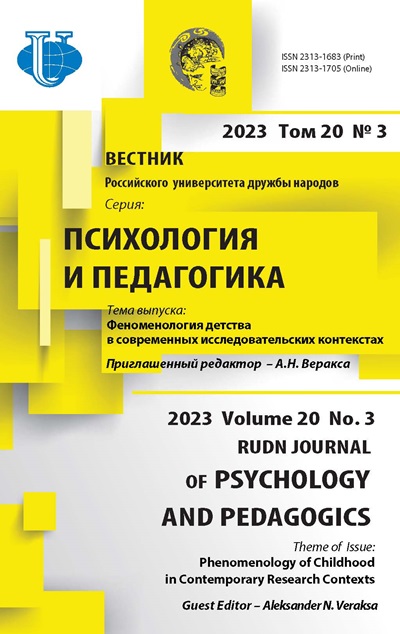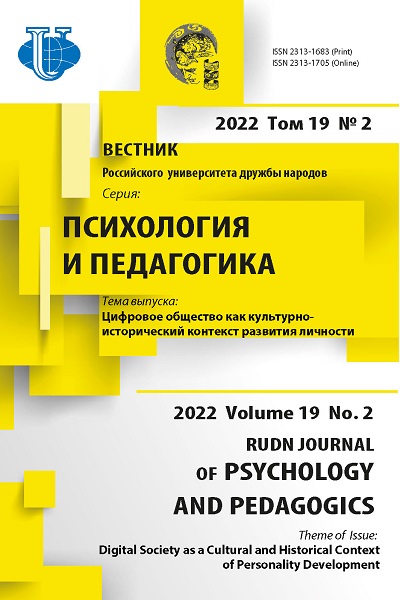Radicalization in the Digital Society: A Social Psychological Analysis
- Authors: Bovina I.B.1, Bovin B.G.2, Dvoryanchikov N.V.1
-
Affiliations:
- Moscow State University of Psychology and Education
- Research Institute of the Federal Penitentiary Service of Russia
- Issue: Vol 19, No 2 (2022): Digital Society as a Cultural and Historical Context of Personality Development
- Pages: 336-351
- Section: DIGITAL SOCIETY: OPPORTUNITIES AND CHALLENGES
- URL: https://journals.rudn.ru/psychology-pedagogics/article/view/31395
- DOI: https://doi.org/10.22363/2313-1683-2022-19-2-336-351
Cite item
Full Text
Abstract
Terrorism is not a new phenomenon, it has existed for more than two millennia, developing, changing and acquiring new features and peculiarities of a particular historical period. Nevertheless, terrorism has kept one feature unchanged: it still poses a serious threat to humanity. The way a person comes to recognize the legitimacy of terrorist activity describes the process of radicalization. This article is focused on a social psychological analysis of the impact of information strategies on the process of radicalization in modern society. The relevance of addressing this problem is explained by the fact that measures to counter terrorism are necessarily based on knowledge of the psychological patterns by which radicalization occurs. The article consists of two parts: in the first part, the specifics of the problem of terrorism and radicalization within the framework of social psychological knowledge are discussed. Particular attention is paid to the fact that the process of radicalization is a form of collective response to a situation of intergroup conflict (real or imaginary). In addition, in this part of the article, the role of communication in the process of radicalization is indicated. The second part deals with the specifics of communication processes (their content and form) in connection with radicalization in the digital society.
Keywords
About the authors
Inna B. Bovina
Moscow State University of Psychology and Education
Email: innabovina@yandex.ru
ORCID iD: 0000-0002-9497-6199
PhD in Psychology, is Research Director, Associate Professor, Department of Clinical and Legal Psychology
29 Sretenka St, Moscow, 127051, Russian FederationBoris G. Bovin
Research Institute of the Federal Penitentiary Service of Russia
Email: bovinbg@yandex.ru
ORCID iD: 0000-0001-9255-7372
PhD in Psychology, is Associate Professor, Leading Researcher
15A Narvskaya St, bldg 1, Moscow, 125130, Russian FederationNikolay V. Dvoryanchikov
Moscow State University of Psychology and Education
Author for correspondence.
Email: dvorian@gmail.com
ORCID iD: 0000-0003-1462-5469
PhD in Psychology, is Dean of the Faculty of Legal and Forensic Psychology
29 Sretenka St, Moscow, 127051, Russian FederationReferences
- Baudrillard, J. (2017). L'esprit du terrorisme. La guerre du Golfe n'a pas eu lieu. Moscow: Ripol-Klassik Publ. (In Russ.)
- Bogomolova, N.N. (2008). Social psychology of mass communication. Moscow: Aspekt Press. (In Russ.)
- Borum, R. (2011a). Radicalization and involvement in violent extremism I: A review of definitions and applications of social science theories. Journal of Strategic Security, 4(4), 7–36. http://doi.org/10.5038/1944-0472.4.4.1
- Borum, R. (2011b). Radicalization and involvement in violent extremism II: A review of conceptual models and empirical research. Journal of Strategic Security, 4(4), 37–62. http://doi.org/10.5038/1944-0472.4.4.2
- Buschini, F. (2016, November 17–18). Diffusion, propagation, propagande: et après? L’effusion, un nouveau mode de communication médiatique pour l’étude des représentations sociales. EASP Small group meeting in honor of Serge Moscovici.
- Chainikov, Yu.V. (2019). 2019.04.008. Khosrokhavar F. Kiber-Khalifat IGIL*. Khosrokhavar F. Le cyber-califat de Daech // Carnet du Caps. – Paris, 2018. – N 26. – Р. 89–100. Sotsial'nye i Gumanitarnye Nauki. Otechestvennaya i Zarubezhnaya Literatura. Seriya 9: Vostokovedenie i Afrikanistika. Referativnyi Zhurnal, (4), 96–99. (In Russ.)
- Conesa, P., Huyghe, F.B., & Chouraqui, M. (2016). La Propagande Francophone De Daech: La Mythologie Du Combattant Heureux. FMSH. Observatoire Des Radicalisations. Paris.
- Cronin, A.K. (2003). Behind the curve. Globalization and international terrorism. International Security, 27(3), 30–58. https://doi.org/10.1162/01622880260553624
- Doise, W. (1986). Levels of explanation in social psychology. (E. Mapstone, Trans.). Cambridge: Cambridge University Press.
- Emelin, V.A., & Tkhostov, A.Sh. (2019). The modern radicalism: Phenomenology, origin and mechanisms. Voprosy Filosofii, (7), 89‒98. (In Russ.) https://doi.org/10.31857/S004287440005730-8
- Emelin, V.A., Rasskazova, E.I., & Tkhostov, A.Sh. (2012). Technology and identity: Identification transformation under the influence of technical progress. Modern Studies of Social Issues, (9), 33. (In Russ.)
- Gelfand, M.J., LaFree, G., Fahey, S., & Feinberg, E. (2013). Culture and extremism. Journal of Social Issues, 69(3), 495–517. https://doi.org/10.1111/josi.12026
- Hamid, N., Atran, S., Gomez, A., Ginger, J., Sheikh, H., López-Rodríguez, L., & Vázquez, A. (2017, July 5–8). Terror networks: Their ecologies and evolution. 18th General Meeting of the European Association of Social Psychology. Granada.
- Hogg, M.A. (2007). Uncertainty-identity theory. In M.P. Zanna (Ed.), Advances in Experimental Social Psychology, 39, 69–126. https://doi.org/10.1016/S0065-2601(06)39002-8
- Kalmus, V. (2007). Socialization in the changing information environment: Implications for media literacy. In D. Macedo & S.R. Steinberg (Eds.), Media Literacy: A Reader (pp.157–165). New York: Peter Lang.
- Kende, A., Ujhelyi, A., Joinson, A., & Greitemeyer, T. (2015). Putting the social (psychology) into social media. European Journal of Social Psychology, 45(3), 277–278. https://doi.org/10.1002/ejsp.2097
- Khosrokhavar, F. (2017). Radicalization: Why some people choose the path of violence (J.M. Todd, Trans.). New York: The New Press.
- King, M., & Taylor, D.M. (2011). The radicalization of homegrown Jihadists: a review of theoretical models and social psychological evidence. Terrorism and Political Violence, 23(4), 602–622. https://doi.org/10.1080/09546553.2011.587064
- Koomen, W., & Van der Pligt, J. (2016). Introduction. In W. Koomen & J. Van der Pligt (Eds.), The Psychology of Radicalization and Terrorism (pp. 1–11). New York: Routledge. https://doi.org/10.4324/9781315771984
- Kruglanski, A., & Fishman S. (2009). Psychological factors in terrorism and counterterrorism: Individual, group, and organizational levels of analysis. Social Issues and Policy Review, 3, 1–44. https://doi.org/10.1111/j.1751-2409.2009.01009.x
- Livingstone, S., Haddon, L., Görzing, A., & Őlafsson, K. (2011). EU Kids Online: final report 2011. London.
- Marzouki, Y. (2016). La conscience collective virtuelle: un nouveau paradigme des comportements collectifs en ligne. In G. Lo Monaco, S. Delouvée & P. Rateau (Eds.), Les représentations sociales. Théories, méthodes et applications (pp. 413–415). Louvain-la-Neuve: De Boeck Supérieur.
- McCauley, C., & Moskalenko, S. (2008). Mechanisms of political radicalization: Pathways towards terrorism. Terrorism and Political Violence, 20(3), 415–433. https://doi.org/10.1080/09546550802073367
- Moghaddam, F.M. (2005). The staircase to terrorism: a psychological exploration. American Psychologist, 60(2), 161–169. https://doi.org/10.1037/0003-066x.60.2.161
- Moliner, P., Bovina, I., & Tikhonova, A. (2018). Images propagatrices et textes propagandistes dans la communication islamiste. Congrès International de Psychologie Sociale en Langue Française (Louvain-la-Neuve, 4–6 juillet 2018). 12ème edition. Louvain-la-Neuve.
- Moscovici, S. (1976). La psychanalyse, son image et son public. Paris: Presses Universitaires de France.
- Pfundmair, M., Aßmann, E., Kiver, B., Penzkofer, M., Scheuermeyer, A., Sust, L., & Schmidt, H. (2022). Pathways toward Jihadism in Western Europe: An empirical exploration of a comprehensive model of terrorist radicalization. Terrorism and Political Violence, 34(1), 48–70. https://doi.org/10.1080/09546553.2019.1663828
- Rakitov, A.I. (1994). A new approach to the relationship of history, information and culture: The example of Russia. Voprosy Filosofii, (4), 14–34. (In Russ.)
- Rose, G. (2014). On the relation between ‘visual research methods’ and contemporary visual culture. Sociological Review, 62(1), 24–46. https://doi.org/10.1111/1467-954X.12109
- Silke, A. (2019). The study of terrorism and counterterrorism. Routledge Handbook of Terrorism and Counterterrorism (pp. 1–10). New York: Routledge. https://doi.org/10.4324/9781315744636
- Smahel, D., Machackova, H., Mascheroni, G., Dedkova, L., Staksrud, E., Ólafsson, K., Livingstone, S., & Hasebrink, U. (2020). EU Kids Online 2020: Survey results from 19 countries. London. https://doi.org/10.21953/lse.47fdeqj01ofo
- Spencer, A.N. (2016). The hidden face of terrorism: An analysis of the women in Islamic state. Journal of Strategic Security, 9(3), 74–98. http://doi.org/10.5038/1944-0472.9.3.1549
- Tateo, L. (2016). Représentations sociales et nouvelles technologies. In G. Lo Monaco, S. Delouvée & P. Rateau (Eds.), Les représentations sociales. Théories, méthodes et applications (pp. 399–408). Louvain-la-Neuve: De Boeck Supérieur.
- Tikhonova, A.D., Dvoryanchikov, N.V., Ernst-Vintila, A., & Bovina, I.B. (2017). Radicalisation of adolescents and youth: In search of explanations. Cultural-Historical Psychology, 13(3), 32–40. (In Russ.) https://doi.org/10.17759/chp.2017130305
- Van Stekelenburg, J., & Klandermans, P. (2010). Radicalization. In A.E. Azzi, X. Chryssochoou, B. Klandermans & B. Simon (Eds.), Identity and Participation in Culturally Diverse Societies. A Multidisciplinary Perspective (pp. 181–194). Oxford: Blackwell Publishing Ltd. https://doi.org/10.1002/9781444328158.ch9
- Van Stekelenburg, J., Oegema, D., & Klandermans, P.G. (2010). No radicalization without identification: How ethnic Dutch and Dutch Muslim web forums radicalize over time. In A.E. Azzi, X. Chryssochoou, B. Klandermans & B. Simon (Eds.), Identity and Participation in Culturally Diverse Societies. A Multidisciplinary Perspective (pp. 256–274). Oxford: Blackwell Publishing Ltd. https://doi.org/10.1002/9781444328158.ch13
- Wieviorka, M. (2020). From the “classic” terrorism of the 1970s to contemporary “global” terrorism. In D. Jodelet, J. Vala & E. Drozda-Senkowska (Eds.), Societies Under Threat (pp. 75–85). Cham: Springer. https://doi.org/10.1007/978-3-030-39315-1_7
- Yurevich, A.V. (2013). Three sources and three components of maintaining morality in society. In A.L. Zhuravlev & A.V. Yurevich (Eds.), Psychological studies of morality (pp. 8–27). Moscow: Institute of Psychology of the Russian Academy of Sciences Publ. (In Russ.)
















